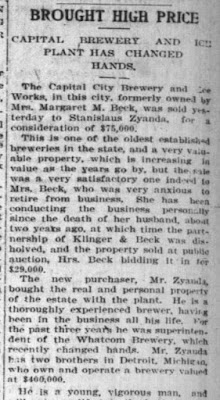For the Mill's "Zooming back to History" series, on Thursday the 16th historian and archivist Tiah Edmunson-Morton of Oregon State University will discuss “Women behind the pints: Oregon’s 19th century brewery wives.”
 |
| Mrs. M. Beck, Proprietor July 15th, 1902 and Feb. 6th, 1903 |
You may recall that Mrs. Margaret Beck seemed to be a good candidate for the talk. Her brewery was where the Sculpture Garden is now for the Conference Center.
 |
| Chemeketa Hotel (l) and Capital Brewery (r) WHC 2014.082.0055.003 and Salem Library Historic Photos |
 |
| The brewery after several rounds of expansion at the Conference Center Sculpture Garden site (Sick's Brewery via Salem Library Historic Photo) |
Edmunson-Morton agrees that Mrs. Beck is interesting. And in preparation for her talk, she's published some background with some terrific findings:
- "Salem beer history, advertising stock phrases, and a 'pure beer' research plunge."
- "Beck v. Shultz: the battle for the lucky bear"
- "Purity, Progress, Patriotism"
- "Pure Food and Prohibition"
- "Why certainly! This beer is good for you"
- "Maltona, Maltina, Malt Tea"
I want to emphasize a part that might be worth more attention. Edmundson-Morton writes:
Seraphin died in 1899 and there was a somewhat protracted legal battle over his estate. In the end, Margaret outbid Klinger to buy the business, and then ran it for 3 years before selling it to Stanislaus Zyanda, a representative for the Salem Brewery Association.
The legal battle is interesting. It's hard to know exactly what was going on, and it is possible that there was a constructive, collaborative purpose to the lawsuits, but on first glance, the way I have read these is that Margaret Beck had to fend off the attempt by Maurice Klinger to depress the value of her asset and to seize it. It's hard to read his actions as those of an ally and partner. Over two years, with lots of advertising in her name, she built the value back up, and then sold the brewery. So in addition to all the other dimensions, she was protecting family assets and acting not just as brewer but as business owner. (And then, at the end, there is what might be a great plot twist!)
 |
| August 11th, 1899 |
Seraphin Beck had died in 1899, and settling the estate indeed seemed a little complicated.
After a year, one of the partners, Maurice Klinger tried to force a sale.
 |
| November 8th, 1900 |
 |
| May 4th, 1901 |
The news says "the sale was forced and it was bid in as a means of protection and to realize therefrom what the bidder [Mrs. Beck] considered was the true valuation..."
 |
| May 7th, 1901 |
She only stayed in for two years, and sold the brewery at a better valuation, going from $30,000 to $75,000.
 |
| June 5th, 1903 |
Then, a little over a decade later, as Prohibition gained momentum, there is a tantalizing hint that she might not have been all that engaged by beer in the first place! Or perhaps had a change of heart, whether sincere or just following the culture. It's also possible it's a different "Mrs. M. Beck." We'll leave it ambiguous for the moment.
 |
| February 11th, 1915 |
The talk at the Mill sounds like it will be fascinating, and an important corrective to our male-dominated histories of beer.


1 comment:
Edmunson-Morton wrote more on Margaret Beck!
- On the interpretation of limited evidence, "What do we do with data?"
- With news that she remarried in 1906 and probably is not the same Mrs. Beck at the 1915 WCTU meeting, "Mrs. Beck, a 'lady of culture and refinement' with a 'keen discrimination in matters of trade'"
- "Margaret Beck and the lawsuits"
Post a Comment